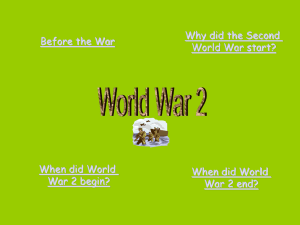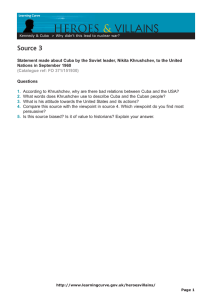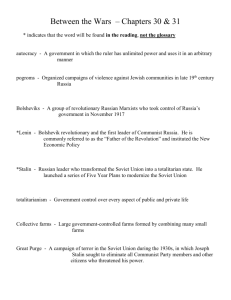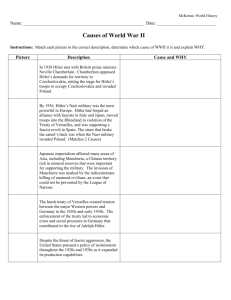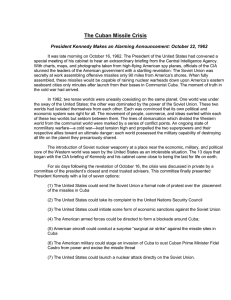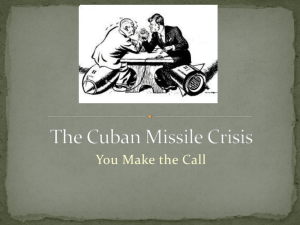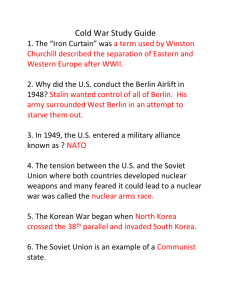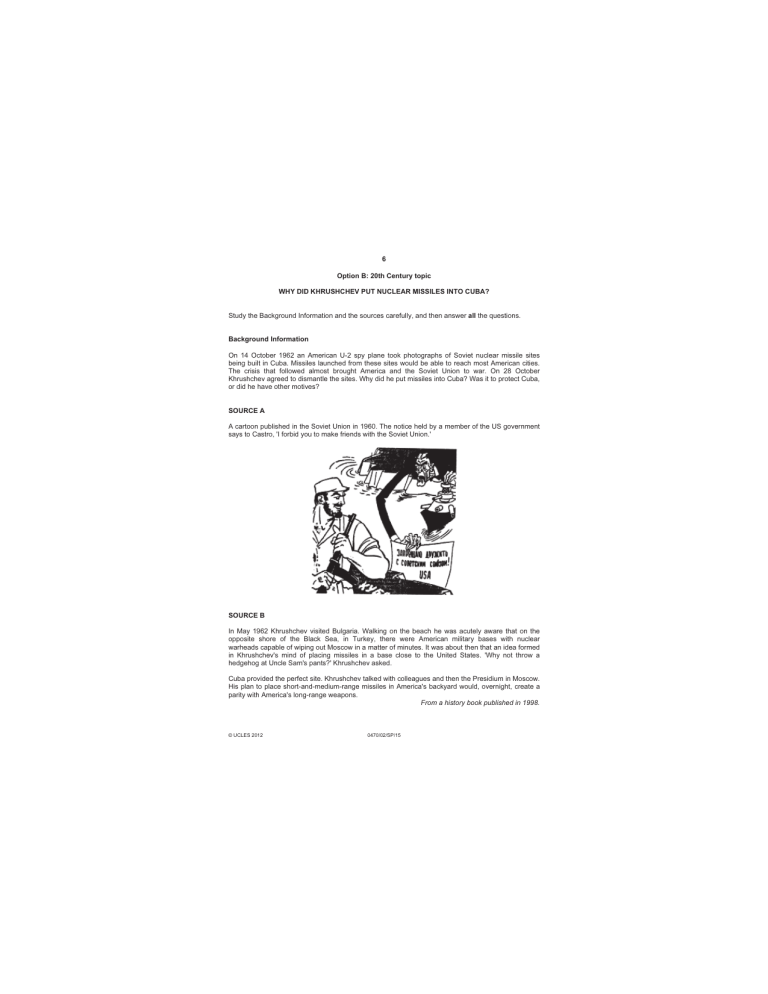
6 Option B: 20th Century topic WHY DID KHRUSHCHEV PUT NUCLEAR MISSILES INTO CUBA? Study the Background Information and the sources carefully, and then answer all the questions. Background Information On 14 October 1962 an American U-2 spy plane took photographs of Soviet nuclear missile sites being built in Cuba. Missiles launched from these sites would be able to reach most American cities. The crisis that followed almost brought America and the Soviet Union to war. On 28 October Khrushchev agreed to dismantle the sites. Why did he put missiles into Cuba? Was it to protect Cuba, or did he have other motives? SOURCE A A cartoon published in the Soviet Union in 1960. The notice held by a member of the US government says to Castro, 'I forbid you to make friends with the Soviet Union.' SOURCE B In May 1962 Khrushchev visited Bulgaria. Walking on the beach he was acutely aware that on the opposite shore of the Black Sea, in Turkey, there were American military bases with nuclear warheads capable of wiping out Moscow in a matter of minutes. It was about then that an idea formed in Khrushchev's mind of placing missiles in a base close to the United States. 'Why not throw a hedgehog at Uncle Sam's pants?' Khrushchev asked. Cuba provided the perfect site. Khrushchev talked with colleagues and then the Presidium in Moscow. His plan to place short-and-medium-range missiles in America's backyard would, overnight, create a parity with America's long-range weapons. From a history book published in 1998. © UCLES 2012 0470/02/SP/15 7 SOURCE C Cuba's geographical position has always made it very vulnerable to its enemies. We were sure that the Americans would never reconcile themselves to the existence of Castro's Cuba. Given this continual threat of American interference, what should our own policy be? This question was constantly on my mind, and I frequently discussed it with the other members of the Presidium. Everyone agreed that America would not leave Cuba alone unless we did something. While I was on an official visit to Bulgaria, one thought kept hammering away at my brain: what will happen if we lose Cuba? The logical answer was missiles. The United States had already surrounded the Soviet Union with its own bomber bases and missiles. It was during my visit to Bulgaria that I had the idea of installing missiles with nuclear warheads in Cuba. From Khrushchev's memoirs published in 1971. SOURCE D A cartoon published in Britain, 17 October 1962. President Kennedy is on the left, Khrushchev is on the right. Both men are reading books entitled ‘Hints On Pruning’. (Pruning means cutting back.) © UCLES 2012 0470/02/SP/15 [Turn over 8 SOURCE B The French would not operate their alliance with Czechoslovakia; on the other hand they would not give it up. The French were dragging the British down with them. Britain was the country most remote from the Czech affair; yet she had to take the lead. The British must undertake to ‘solve’ the Sudeten question – how, it did not matter – as long as war was averted. Hitler remained the master of delay, refusing to show his hand. Preparations were pushed forward for attacking Czechoslovakia but this was far from a decision for war. The German generals continued to insist that they could not face a general war. Hitler steadily replied that it would not be necessary. Hitler’s patience was not exhausted. He still waited for the nerves of others to crack. Chamberlain flew to Germany on 15 September. Hitler’s main concern at the meeting was to keep the crisis going until Czechoslovakia disintegrated. Chamberlain remained faithful to his policy of appeasement: ‘I had nothing to say against the separation of the Sudeten Germans from the rest of Czechoslovakia.’ On 22 September Chamberlain again met Hitler. Hitler declared that the Anglo-French proposals were no longer enough. Sudeten Germans were being massacred – Sudetenland must be occupied by German troops at once. Why did Hitler take this line, when he was to receive by negotiation all that he had demanded? Did he want war for its own sake? There is another explanation. Others, such as the Poles and the Hungarians, were advancing claims to Czechoslovak territory. There was a good chance that Czechoslovakia would break into pieces. Germany would come in as a peace-maker. Hence, Hitler was playing for time. The Godesberg meeting ended in failure for Chamberlain. Hitler returned home where he spent his time drawing dream-plans for the rebuilding of Linz, the Austrian town where he went to school. Once more he waited for events to provide him with future success. From a history book published in 1961. SOURCE C A cartoon published in Britain, September 1938. © UCLES 2015 0470/21/M/J/15 9 SOURCE D A cartoon published in the Soviet Union, 1939. The signpost says left to western Europe and right to the USSR. SOURCE E The Sudetenland is the last problem that must be solved and it will be solved. It is the last territorial claim which I have to make in Europe. I have no further interest in the Czech state. We want no Czechs! The aims of our foreign policy are not unlimited. They are grounded on the determination to save the German people alone. In 1919 ten million Germans found themselves beyond the frontiers of Germany, Germans who wish to return to the Reich as their homeland. From a public speech by Hitler, 26 September 1938. SOURCE F Give thanks to your God. The wings of peace settle about us and the people of Europe. It was the war that nobody wanted. Nobody in Germany. Nobody in France. Nobody, above all, in Britain, which had no concern whatever with the issues at stake. If we must have a victor, let us choose Chamberlain. Millions of happy homes and hearts are relieved of their burden. Now let us get back to our own affairs. From a British newspaper, 30 September 1938. SOURCE G I will begin by saying what everybody would like to ignore or forget. We have experienced a total defeat. Silent, mournful, abandoned, broken Czechoslovakia disappears into the darkness. You will find that sooner or later Czechoslovakia will be swallowed up in the Nazi regime. And do not suppose this is the end. This is only the beginning. Churchill speaking in the debate in the British Parliament about the Munich Agreement, 3 October 1938. © UCLES 2015 0470/21/M/J/15 [Turn over
